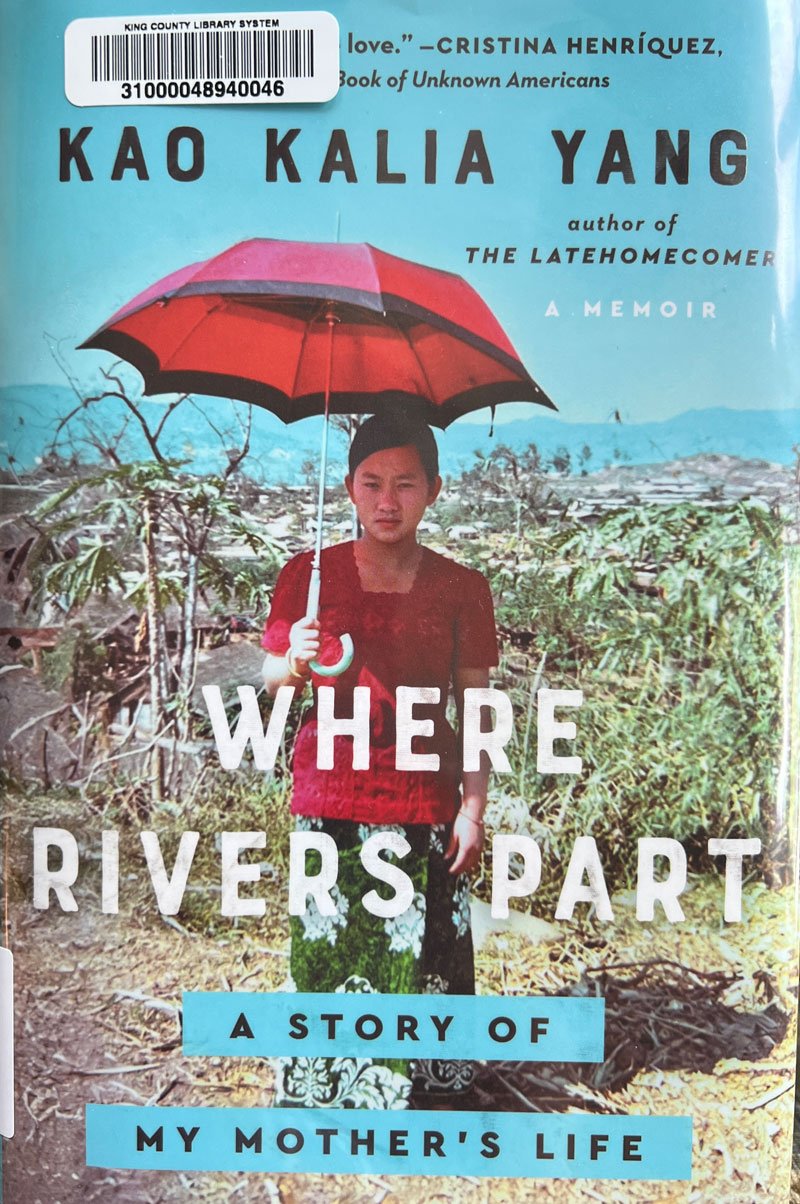Traveling through History with Kao Kalia Yang
Where Rivers Part book cover.
Traveling through history with Kao Kalia Yang
Shortly before my recent trip to Italy and France, a library notice posted on my phone telling me that my most recent hold had arrived at the Kirkland Library. I was frustrated because I thought I’d arranged to “pause” my books on hold until after my trip. I either didn’t do it correctly or the library made a mistake and now I had to decide whether to pick up the book or allow it to return to circulation. I’m a slow reader so it was unlikely I could finish the book before I needed to leave for the airport, but I decided to give it a try and then finish the book when I returned from my travels. That worked. It was engaging enough that time flew by as I read Kao Kalia Yang’s most recent book, Where Rivers Part, the story of the life of the author’s mother. I had put it on hold after listening to an author interview on NPR.
Why was I so anxious to read this book and also eager to share the story with my friends? I first learned about Kao Kalia Yang in a communication from Carleton College, where she and I both earned B.A. degrees, not at the same time. When I first read about her, she had just published her first book, The Latehomecomer. It was her story of life as a Hmong refugee and the experiences she and her family had in a refugee camp in Thailand, after escaping from Laos, where she was born. She was 6 years old when she and her family were resettled to St. Paul, Minnesota. The Latehomecomer was a powerful story of family relationships, survival, and transformation, but it also provided a window into another world. What I knew of the Hmong people was minimal – that many lived in the Seattle area, some of them growing flowers sold in local markets. I also knew that they had been victimized in Asia because of actions during the Vietnam War. Her book taught me about a culture that was new to me and helped me better understand the consequences of military actions taken during the years of my high school and college education, when my friends and family members were concerned about getting drafted and many were protesting the war. We knew little or nothing about the war in Laos.
Where Rivers Part is an unusual book in many respects. Books by Hmong authors continue to be rare, but this book is unusual in other ways. Yang’s book tells the history of her family and includes a list of names of relatives who appear in the book. There are references to over 25 family members by name and multiple relatives who died whose names were lost, as well as mention of the seven miscarriages her mother experienced. There are pronunciation notes for names spelled in Hmong but difficult for an English speaker to pronounce or remember. There’s also a map provided with names of unfamiliar locations inside Laos. As a reader I was also challenged by the author’s decision to write the book with her mother as narrator. The author has written the Prologue and Epilogue from her own perspective, but the balance of the book is from the voice of her mother. It is beautifully written, but I kept wondering how the author knew the thoughts and desires of her mother and how her immigrant mother could express herself so poetically. Despite these challenges to reading the book, I loved it.
I admired the family’s closeness and loyalty to one another, their resilience in the face of dangers occurring every day, and their courage in moving toward an unknown future. The family relationships and their determination to share stories and history made me wish I had experienced the same degree of story-telling and inspiration in my own life. The book is also valuable in helping the reader see American society from the standpoint of outsiders who struggle with English, live in poverty, and are often disrespected in public places and the workplace. We need to learn about the injustices experienced by others to remind us of the consequences of our own behavior and decisions of our government. We can also appreciate the value of some of the benefits this immigrant family was able to receive: U.S. visas and work permits after years languishing in a refugee camp, Christmas gifts from charities, subsidized housing, and college scholarships.
In my school experiences, it seemed that history was taught through accounts of military battles and the names of significant political and military leaders, nearly all men. It can be much more meaningful to learn history though the impact of political and military decisions on ordinary individuals and their families. In my recent trip to Europe guides spent much of their time recounting the history of warring political leaders and the rise and fall of empires, along with pointing out the remains of ancient buildings and monuments to heroes and religious figures. What was usually missing were the details of the lives of ordinary people, which make history come alive and help us better understand changes that have occurred over time.
I look forward to reading additional books by Kao Kalia Yang. I found several author interviews and lectures posted online and I recommend them as well as her books.
Carolyn Hayek

